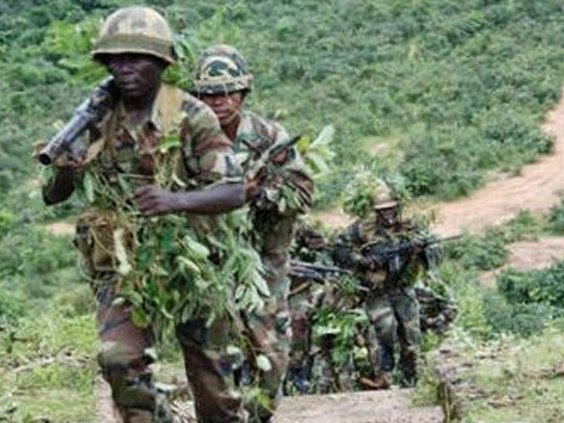Aug. 11 (GIN) – Wives of military soldiers say they are fed up with government’s top brass sending under-equipped foot soldiers to fight the better-armed Boko Haram rebels. Skirmishes with the rebel fighters left hundreds dead last week in the north-eastern city of Gwoza in Borno state.
Press reports estimated that about 100 women were protesting at the Giwa barracks in Maiduguri, Borno’s capital.
Rising unhappiness with the country’s military leadership lead to the shooting last May by soldiers of their commander, Maj-Gen Ahmed Mohammed, at Maiduguri’s Maimalari barracks. They blamed him for the killing of their colleagues by Boko Haram fighters.
One protesting military wife, speaking to the BBC, explained why they opposed their spouses being sent into battle. “Our husbands have been fighting Boko Haram for six years now. If they get killed or injured, they [the army] will not take care for us.”
When their husbands were sent to the front line on March 13, Boko Haram launched an assault on the barracks the next day, she said. Her home was burned, and her neighbor’s four children were killed, she said. “Now [the army] wants to send our husbands to Gwoza and we say ‘no’.”
Meanwhile, a report in the Wall St Journal says that recent U.S. surveillance flights over northeastern Nigeria show what appears to be large groups of girls held together in remote locations, raising hopes among domestic and foreign officials that they are among the group that Boko Haram abducted from a boarding school in April.
The surveillance suggests that at least some of the 219 schoolgirls still held captive haven’t been forced into marriage or sex slavery, as had been feared, but instead are being used as bargaining chips for the release of prisoners.
The U.S. aerial imagery matches what Nigerian officials say they hear from northern Nigerians who have interacted with the Islamist insurgency: that some of Boko Haram’s most famous set of captives are getting special treatment, compared with the hundreds of other girls the group is suspected to have kidnapped.
Boko Haram appears to have seen the schoolgirls as of higher value, given the global attention paid to their plight, those officials said.
The government of Pres. Goodluck Jonathan has ruled out a rescue operation, saying it is unwilling to risk the girls’ lives, or a prisoner swap.
Also in Nigeria, video footage, images, and testimonies of war crimes committed by government forces and Islamist insurgents in the country’s northeast have been obtained by Amnesty International, the rights group reports. “Gruesome” evidence includes images of detainees whose throats were cut and their bodies “dumped in mass graves by men who appear to be members of the Nigerian military.”
“This shocking new evidence is further proof of the appalling disregard for humanity in northeastern Nigeria, where war crimes are being committed with abandon by all sides in the conflict,” Amnesty said.
A government spokesman has denied the accusations by the rights organization.
Violence in Nigeria has forced some 250,000 people from their homes this year, according to the government’s relief agency.
More than three million people are facing a humanitarian crisis. w/pix of Nigerian soldiers








